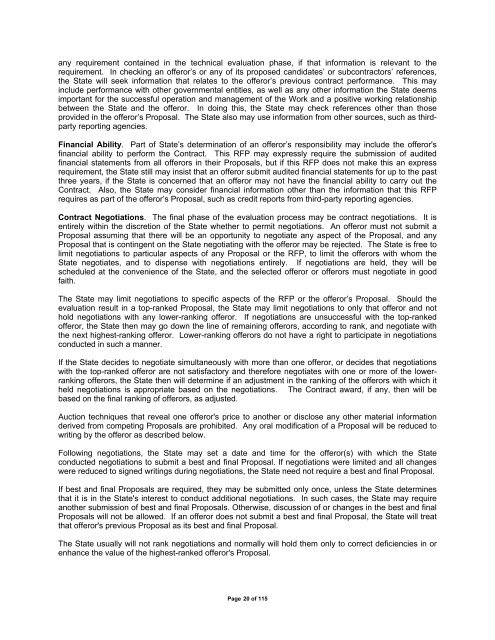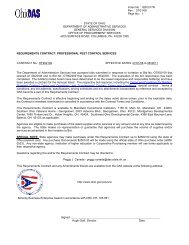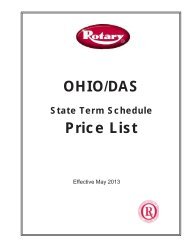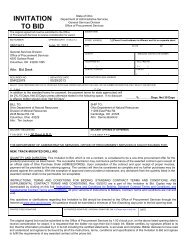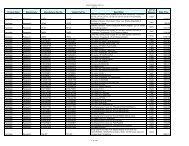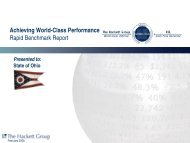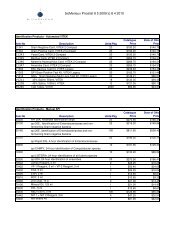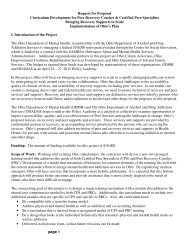REQUEST FOR PROPOSALS RFP NUMBER: 0A1031 DATE ISSUED
REQUEST FOR PROPOSALS RFP NUMBER: 0A1031 DATE ISSUED
REQUEST FOR PROPOSALS RFP NUMBER: 0A1031 DATE ISSUED
Create successful ePaper yourself
Turn your PDF publications into a flip-book with our unique Google optimized e-Paper software.
any requirement contained in the technical evaluation phase, if that information is relevant to the<br />
requirement. In checking an offeror’s or any of its proposed candidates’ or subcontractors’ references,<br />
the State will seek information that relates to the offeror’s previous contract performance. This may<br />
include performance with other governmental entities, as well as any other information the State deems<br />
important for the successful operation and management of the Work and a positive working relationship<br />
between the State and the offeror. In doing this, the State may check references other than those<br />
provided in the offeror’s Proposal. The State also may use information from other sources, such as thirdparty<br />
reporting agencies.<br />
Financial Ability. Part of State’s determination of an offeror’s responsibility may include the offeror's<br />
financial ability to perform the Contract. This <strong>RFP</strong> may expressly require the submission of audited<br />
financial statements from all offerors in their Proposals, but if this <strong>RFP</strong> does not make this an express<br />
requirement, the State still may insist that an offeror submit audited financial statements for up to the past<br />
three years, if the State is concerned that an offeror may not have the financial ability to carry out the<br />
Contract. Also, the State may consider financial information other than the information that this <strong>RFP</strong><br />
requires as part of the offeror’s Proposal, such as credit reports from third-party reporting agencies.<br />
Contract Negotiations. The final phase of the evaluation process may be contract negotiations. It is<br />
entirely within the discretion of the State whether to permit negotiations. An offeror must not submit a<br />
Proposal assuming that there will be an opportunity to negotiate any aspect of the Proposal, and any<br />
Proposal that is contingent on the State negotiating with the offeror may be rejected. The State is free to<br />
limit negotiations to particular aspects of any Proposal or the <strong>RFP</strong>, to limit the offerors with whom the<br />
State negotiates, and to dispense with negotiations entirely. If negotiations are held, they will be<br />
scheduled at the convenience of the State, and the selected offeror or offerors must negotiate in good<br />
faith.<br />
The State may limit negotiations to specific aspects of the <strong>RFP</strong> or the offeror’s Proposal. Should the<br />
evaluation result in a top-ranked Proposal, the State may limit negotiations to only that offeror and not<br />
hold negotiations with any lower-ranking offeror. If negotiations are unsuccessful with the top-ranked<br />
offeror, the State then may go down the line of remaining offerors, according to rank, and negotiate with<br />
the next highest-ranking offeror. Lower-ranking offerors do not have a right to participate in negotiations<br />
conducted in such a manner.<br />
If the State decides to negotiate simultaneously with more than one offeror, or decides that negotiations<br />
with the top-ranked offeror are not satisfactory and therefore negotiates with one or more of the lowerranking<br />
offerors, the State then will determine if an adjustment in the ranking of the offerors with which it<br />
held negotiations is appropriate based on the negotiations. The Contract award, if any, then will be<br />
based on the final ranking of offerors, as adjusted.<br />
Auction techniques that reveal one offeror's price to another or disclose any other material information<br />
derived from competing Proposals are prohibited. Any oral modification of a Proposal will be reduced to<br />
writing by the offeror as described below.<br />
Following negotiations, the State may set a date and time for the offeror(s) with which the State<br />
conducted negotiations to submit a best and final Proposal. If negotiations were limited and all changes<br />
were reduced to signed writings during negotiations, the State need not require a best and final Proposal.<br />
If best and final Proposals are required, they may be submitted only once, unless the State determines<br />
that it is in the State's interest to conduct additional negotiations. In such cases, the State may require<br />
another submission of best and final Proposals. Otherwise, discussion of or changes in the best and final<br />
Proposals will not be allowed. If an offeror does not submit a best and final Proposal, the State will treat<br />
that offeror's previous Proposal as its best and final Proposal.<br />
The State usually will not rank negotiations and normally will hold them only to correct deficiencies in or<br />
enhance the value of the highest-ranked offeror's Proposal.<br />
Page 20 of 115


